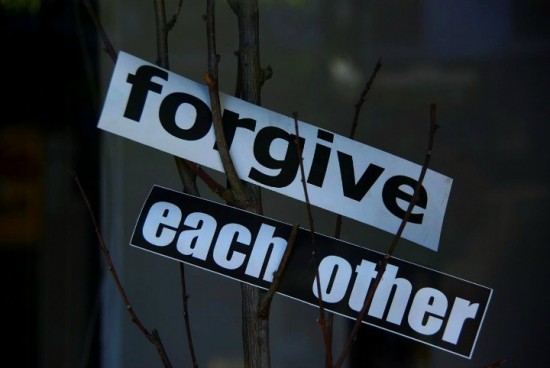I’m sorry.
Please.
Thank you.
Many of us have reminded children to say these phrases more times than we can count. We want our little ones to be polite and respectful, and we know that encouraging them to use these words will help them for the rest of their lives.
A few years ago, I noticed that one phrase seemed to be missing from our family’s lexicon of polite responses, and it was a big one: I forgive you.
We did not consciously leave this phrase out; we just had other ingrained ways of acknowledging penitents. When a person said, “I’m sorry,” the answer was typically, “It’s all right.”
Or, for the more succinct among us, “Okay.”
Sometimes we gave a head-nod to acknowledge receipt of the apology.
We used a lot of different responses, but, “I forgive you,” was not in the rotation. Perhaps it felt too formal? Too stiff?
Whatever the reason, once we recognized this omission, my husband and I began to feel convicted. We knew that forgiveness is one of the most important things we can teach our children. The Gospel is very clear:
“For if you forgive men their trespasses, your heavenly Father also will forgive you; but if you do not forgive men their trespasses, neither will your Father forgive your trespasses.” Matthew 6:14-15
There is no mistaking the message. Forgiveness is nonnegotiable.
 Photo by John Piercy (2008) via
Flickr, CC BY-NC-ND 2.0.
Photo by John Piercy (2008) via
Flickr, CC BY-NC-ND 2.0.
So we began to teach our children not only to say, “I’m sorry,” when they hurt or offended someone else, but to say, “I forgive you,” when someone hurt or offended them. Not, “It’s okay,” or, “No problem.” Always, these three words: “I forgive you.”
For some people, this phrase might come as second nature. For us, it was a new habit that would take work to form.
As a family, we talked about the Scripture verses on forgiveness. We told the children that when we do not feel ready or able to forgive, we can ask Jesus for help and extra grace.
We reminded the children that it is good to say the words, “I forgive you,” even when they do not feel like forgiving. Forgiveness is a decision, not a feeling. We can mean it without feeling it. Often we are tempted by feelings that tell us not to forgive, and it is important to overcome them by an act of the will. (We never force the children, of course, but we do encourage them.)
My husband and I also knew that if we were going to expect it of our children, we needed to model it ourselves. From that point on, when we said, “Sorry,” to each other or heard it from the children, we made a deliberate effort to say, “I forgive you,” in response.
Sounds easy, right? But wow, was it hard. Not only at the beginning. I have had a few years to practice, and it is still hard. I haven’t decided yet which is easier to say—“I’m sorry,” or “I forgive you,”—but for me, I think it might be the latter.
Sometimes I can say, “I forgive you,” right away. Sometimes it takes longer than I want it to for me to push the words out. Sometimes I try to get away with saying it only in my head, but I know that doesn’t count and that eventually I will have to speak the words aloud.
Sometimes I am tempted to say, “That’s okay,” or “Uh-huh,” or nod my head in response to an apology. It’s easy to do those things and not think about actual forgiveness. None of those gestures says anything direct and specific about forgiveness. They are fillers. If words mean anything, we must say the words we mean.
Each time I make a sincere attempt to say the words, “I forgive you,” something happens in my soul. I know I am doing it as a response to the Gospel, and as I fight the ever-present temptation not to say the words, I feel God with me. I feel him watching me to see how I respond. He sees how quick—or slow—I am to forgive. I want to please him, and—let’s be honest—I want him to forgive me fast and fully when my eternity is on the line.
When I finally do say those three words, they feel more real to me than almost any other words I ever speak. They are a prayer; and they are a victory. Not just for me, but for all of us, the body of Christ. When we say them, we win a battle, for ourselves and for the whole body. It might be a response to a small offense, but the battle is big. It is long. If we win the small battles along the way, we can win the war, and by the grace and mercy of God, the Kingdom can become our home forever.
What better gift to give our children than to teach them these three words that contain within them our very hope of heaven?
Copyright 2016 Maura Roan McKeegan
 About the author: Maura Roan McKeegan is the author of the award-winning children’s picture book The End of the Fiery Sword: Adam & Eve and Jesus & Mary, and the newly-released Into the Sea, Out of the Tomb: Jonah and Jesus (Emmaus Road Publishing). Her articles have appeared in publications such as Crisis, Catholic Exchange, Catholic Digest, Franciscan Way, Guideposts, and Lay Witness.
About the author: Maura Roan McKeegan is the author of the award-winning children’s picture book The End of the Fiery Sword: Adam & Eve and Jesus & Mary, and the newly-released Into the Sea, Out of the Tomb: Jonah and Jesus (Emmaus Road Publishing). Her articles have appeared in publications such as Crisis, Catholic Exchange, Catholic Digest, Franciscan Way, Guideposts, and Lay Witness.
About the Author

Guest
We welcome guest contributors who graciously volunteer their writing for our readers. Please support our guest writers by visiting their sites, purchasing their work, and leaving comments to thank them for sharing their gifts here on CatholicMom.com. To inquire about serving as a guest contributor, contact editor@CatholicMom.com.


.png?width=1806&height=731&name=CatholicMom_hcfm_logo1_pos_871c_2728c%20(002).png)
Comments